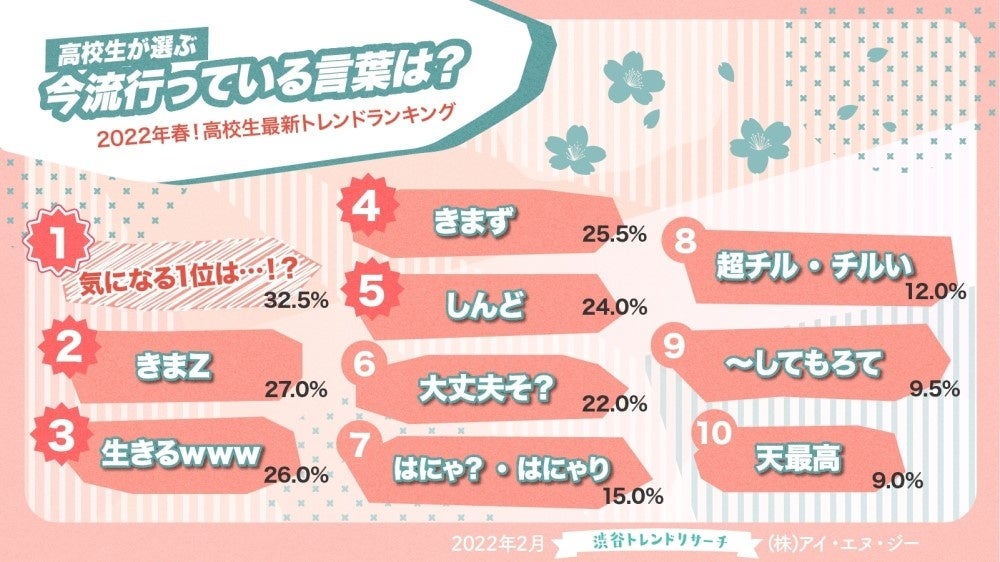Language changes all the time, and in today’s age of social media, trends are shifting faster, and with more influences, than ever before. Last year’s list of hot words, for example, featured an array of slang coined by Japanese Olympic athletes and otaku, as well as a few buzzwords based on trending topics.
Now there’s a new list of trending slang, collected in a survey done by teen marketing company ING. 200 male and female high schoolers in the Kanto region were asked to name the words that are most popular right now, and they were all compiled into a ranking of the top 10 most popular words of spring 2022.

10. Tensaiko
A combination of the words tensai (“genius”) and saiko (“the best”), this is a hot word coined by boyband idol Daigo Nishihata of the Johnny’s group Naniwa Danshi. Since it’s made up of two words that describe something that’s impressive and awesome, it’s kind of the ultimate compliment, to be honest.
9. ~shitemorote
This is an informal way of saying ~shite moratte, which means “have (someone) do something for you.” ~shitemorote was coined by Kansai-based Japanese YouTube duo Paparapys, and their popularity made the unusual twist of the phrase go viral.
8. Cho Chiru / Chirui
Coming from the English word “chill”, these words reflect a state of relaxation. The cho in Cho chiru means “super” or “extremely”, so you could use this to reflect when you’re feeling super chill, and chirui is the adjective form you can use to describe a place that has a good vibe.
7. Hanya / Hanyari
A silly substitution for are? hanya is an interjection used when you’re confused by something. Similarly, hanyari is the state of being confused by something. Both were made popular by celebrity Rei Maruyama, who frequently uses them as her skit personality, Chiaki Inoue, on her YouTube channel, or when acting like an airhead (like in the video above).
6. Daijobuso?
Also coming from YouTube duo Paparapys, this word is somewhat cheeky as it asks whether someone or something is okay or not. The phrase come from taking daijobu, meaning “OK,” tacking on sou, (“probably”), and then lopping off the -u at the end for a snappier sound.
▼ As exemplified in the title, “The Mentaiko Cheese Fami-Chiki is so good, are we okay?”
5. Shindo
A shortening of the adjective shindoi, which usually means “exhausting” or “exhausted”. However, shortened in this way by Japanese Generation Z, it is actually to mean “funny” or “interesting”! Maybe because it’s so interesting it just zaps the energy out of you?
4. Kimazu
This was populated by another Japanese YouTuber, Aya Nakamichi, who has a habit of saying kimazui kimazui, which she uses when describing an awkward situation. Last year, Kimazui kimazui ranked on summer’s most popular words, but it seems like this year it’s been shortened for convenience.
3. Ikiru www
A TikTok video created this hashtag when the user recommended people use this instead of shinu www when something bad happens. Ikiru means “I’m going to live” while Shinu means “I’m going to die”, so the humorous reversal of the words is probably what made this hashtag so popular. “www”, by the way, is a Japanese version of “lol” (because it looks like blades of grass), making it a kind of ironic hashtag that all the kids seem to be using.
2. KimaZ
Pronounced kimazetto. Like Aya Nakamichi’s kimazui kimazui, it means “awkward”. It was coined by YouTuber Toua, who often uses “kimaZ” in awkward situations.
1. Ase-Ase
Another word popularized by YouTuber Aya Nakamichi, used humorously when one is in a pinch or worried or stressed by something. Teens these days use it in speech as well as writing, but when used in writing, it’s specifically written with half-size katakana for visual effect (アセアセ).
Unsurprisingly, the majority of the top words teens are using these days are inspired by social media, specifically popular YouTube and TikTok influencers. Social media has become a huge influence on Gen Z, which is evident in the way they dress as well as the way they talk. We can only hope that we older generations can keep up!
Source: PR Times
Read more stories from SoraNews24.
-- Japanese fisherman becomes TikTok heartthrob, shares cute dance videos while working at sea
-- BuzzFeed’s video of “anime expressions” delivers more laughs than useful language pointers
-- The Japanese you learn at school vs the Japanese used in Japan【Video】
© SoraNews24 Take our user survey and make your voice heard.
Take our user survey and make your voice heard.















9 Comments
Login to comment
Derek Grebe
Children will be children, but dear God, this is irritating.
finally rich
9 in 10 words you listen while walking in places like central Shibuya are:
"Yabbaa" (yabai)
"yabakune?" (yabakunai?)
Thats all the japanese you need to know to get by in that area. If you have low IQ or are under 15 of course
kohakuebisu
My eldest's coming up to 17, so I'll ask her. My initial impression is that this is just Sora News making an article at minimum expense out of Youtube videos it claims are more popular or influential than they actually are.
The "hanya" video has 350,000 views, which isn't bad, but is far from superstar level. You can get that many views with a video about simple DIY like defogging car headlights.
Roten
and are any of these words making it into useful Japanese? If we use these words, will we end up having to explain them to our Japanese friends, and looking even more like the language geeks that many of us are? Will anyone over the age of 15 understand these phrases?
Nicolò
I recommend an adj. "naui," now+i = modern, trendy, newest.
With this prevalent slang you can sound like native speaker!
David Brent
Note that most of the people using these phrases on TV are over 25 and probably university educated. lol!
BackpackingNepal
"Bakayaroh" is also some kinda slang kids use it, I've heard in some Japanese films.